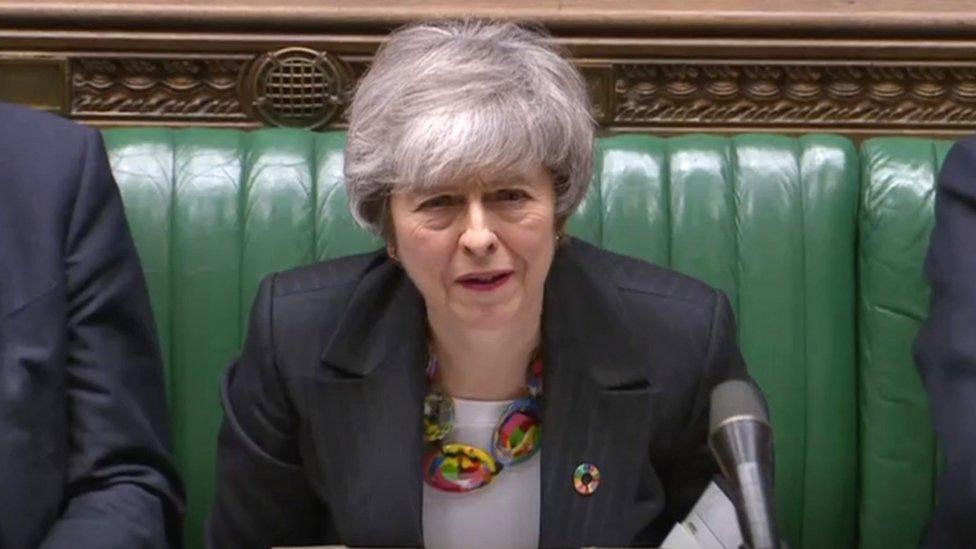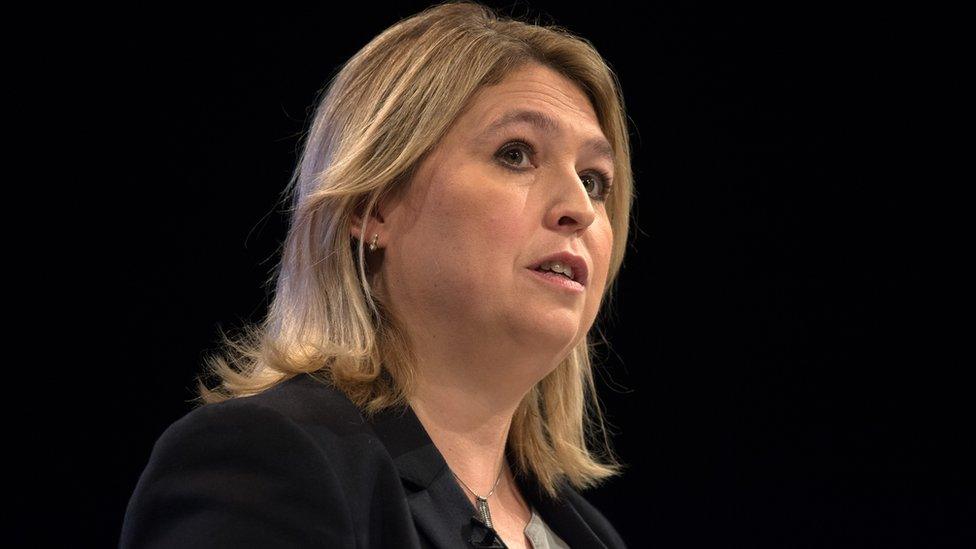Brexit: The mystery that is Theresa May
- Published

The finest Kremlinologists, who spent decades divining the thoughts of those running the Soviet Union, would probably admit defeat over Theresa May.
Sphinx-like, the prime minister gives new meaning to Winston Churchill's description of Russia as a "riddle, wrapped in a mystery, inside an enigma".
"I have just spent an hour with Theresa May and she has not told me a thing, she said nothing," an exasperated friend of hers once told me.
But as the clock ticks down to the UK's scheduled departure from the EU on 29 March, the finest minds at Westminster are embarking on their own bit of May-ology to discover the thoughts of the prime minister.
Cabinet ministers and journalists are trying to work out whether her determination to keep a no-deal Brexit on the table is a negotiating tool to be whisked away at the last minute, or a genuine signal of intent if her deal fails.
Two richly researched pieces in the last 24 hours give slightly different perspectives.
Paul Waugh on the Huffington Post suggests that the prime minister is deadly serious, external about embracing a no deal Brexit if she cannot persuade parliament to accept her deal.
Tom McTague at Politicos writes that senior ministers have no idea which way, external the prime minister would jump in the final hours in the event of a failure to agree a deal.
Amid the fog one fact is clear. Theresa May wants us to believe she is serious about about embracing a no-deal if her deal fails. That is because she regards this as an important card in her negotiations with the EU.
But wanting people to believe she would take no deal seriously is not necessarily the same as wanting it to happen.
One cabinet minister detects a new sense of nerves in No 10 about no deal. The minister tells me the prime minister was spooked by her visits to Belfast and Dublin last week when she heard heartfelt pleas about the dangers of a no-deal Brexit and the possibility of a hard border.
'Visit to Ireland really hit her'
Karen Bradley, an old political ally serving as Northern Ireland secretary, has warned the prime minister that a botched Brexit could lead to an increase in support for Irish unity.
That could oblige her to call a "border poll" - a referendum on whether Northern Ireland remains in the UK or joins the Republic of Ireland. Uncertainty about the future of Northern Ireland would no doubt be seized on by nationalists in Scotland.
The cabinet minister told me: "The prime minister does read the no-deal reports. She was very struck by the response she received in Ireland last week. She really cares about the Union. The visit to Ireland really hit her."
Nerves about no-deal mean Mrs May may be willing to pay a higher than expected price to secure her deal. In an ideal world she would secure legally binding changes from the EU, to ensure the Northern Ireland backstop would have a time limit, or the UK would be able to leave it unilaterally.
Under this scenario the prime minister would hope to win over most, if not all, of the the ten DUP MPs and the bulk of the Tory Brexiteers. A reasonable chunk of Labour MPs, led by Lisa Nandy and Caroline Flint, would compensate for rebellious Tory Brexiteers.
If Downing Street fails to win over enough Labour MPs with commitments on workers' rights, her next option would be to strike a deal with Jeremy Corbyn. If the Labour leader stood by his demand for a customs union, the prime minister would say no.
"It would destroy the Conservative party," one ally said.
But there is another option: throwing the kitchen sink at Labour MPs without crossing any red lines such as accepting a customs union. One ally suggested a good starting point would be £10bn - the amount the prime minister would save if she secured her deal with changes to the Northern Ireland backstop without having to resort to the so-called Malthouse Compromise. This would add an extra year to the transition (at a cost of an extra £10bn) and would then replace the current backstop with technological and other solutions.
The ally said: "Great to pay a lot of money to those Labour MPs. It would be worth billions to avoid no deal. But even avoiding Malthouse saves £10bn. Give them all the bypasses they want."
There was an intriguing hint on Tuesday that Jeremy Corbyn may have clocked this idea himself. In his response to the prime minister's Brexit statement he quoted the GMB leader Tim Roache and the TUC general secretary Frances O'Grady, who have both rejected Theresa May's deal.
But the Labour leader made no mention of his closest union ally, the Unite general secretary Len McCluskey. The FT reported last week that McCluskey is facing criticism from other union leaders for engaging with the government to secure labour market reforms to make it easier for Labour MPs to vote for the deal.
In the end, when we want to work out where the Brexit journey will end, we may need to divine the inner thoughts of not one but two political leaders.
You can watch Newsnight on BBC 2 weekdays 22:30 or on iPlayer. Subscribe to the programme on YouTube, external or follow them on Twitter, external.
- Published16 October 2019

- Published12 February 2019

- Published4 February 2019
